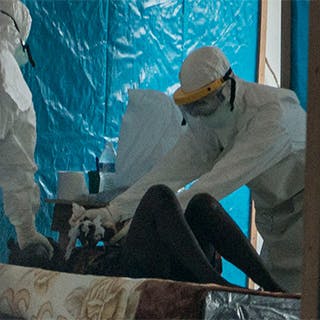Tarik Jasarevic, a spokesperson for the World Health Organization (WHO), has been deployed to West Africa twice in the past few months to manage communications around the Ebola outbreak that has now killed more than 900 people. In April, he spent 2.5 weeks in Guinea, and he just returned to Geneva from a 3.5 week deployment in Guinea and Sierra Leone. I had the chance to talk with him briefly about his experiences and about this unprecedented outbreak.

Chelsea Hedquist: What is the WHO presence in the region, and what role does the organization play?
Tarik Jasarevic: WHO has now deployed more than 120 staff to the region. Some of these are WHO employees, some are employees of other organizations that are deployed through different mechanisms that WHO manages (such as the Global Outbreak Alert & Response Network).
Additionally, WHO already had country offices with permanent staff, and many of these individuals have been “repurposed” to focus fully on Ebola. We have a Sub-Regional Outbreak Coordination Centre, and the idea here is to harmonize the action and the support to Ministries of Health. This coordination mechanism is chaired by Ministries of Health and co-chaired by WHO, and then we have working groups on different elements of the response – epidemiology, social mobilization, logistics, fundraising, etc. We are working closely with a range of partners on the outbreak response, particularly Médecins Sans Frontières, the national Red Cross, CDC, and UNICEF. The new regional response plan [that was announced last week] will help strengthen the coordination mechanisms already in place.
CH: What have been your major responsibilities when deployed in West Africa?
TJ: They are really two-fold. First, I’m responsible for managing communications around the outbreak. This includes being available to report to national and international media about the situation. There has been huge interest recently in the story, which meant that last week I was doing 10 to 15 media interviews per day. My other role is to work with the Ministries of Health and other partners on social mobilization – determining how we can reach the population with accurate information about Ebola and how to prevent its spread.
CH: What have you seen during your time on the ground in Guinea and Sierra Leone? How are the affected countries responding to the outbreak?
TJ: These countries are facing Ebola for the first time, so they don’t necessarily have the experience they need to respond. This is true for health workers; we have seen more than 100 health workers infected – 60 have died – and this is because they didn’t know how to implement infection control measures. But the general population also wasn’t ready to face Ebola. There have been a lot of rumors about Ebola, which has led to a lot of distrust among the public. We have seen villages literally barricading themselves in and refusing entrance to any medical teams. We’ve seen the Minister of Health and the President of the Parliament visiting these villages and actually negotiating with villagers to gain access.
Sometimes the information provided to the public had unintended consequences. For example, originally there was a heavy focus on the message that there is no cure and no vaccine. But this made people think, “If there is no hope for recovery, then why wouldn’t I simply stay home and die here?” So we switched the message to focus on getting to a treatment center as soon as possible, so you have a better chance of survival and a better chance to protect your family. It has taken a lot of time to explain everything to the population, to make them understand that we can only stop the outbreak with their participation.
CH: What are the major barriers to arresting the outbreak and what, specifically, does WHO and its partners need in order to get it under control?
TJ: We currently don’t have enough resources, and I am referring primarily to human resources. We need to bring in experts who can train local health workers to put into place a system of contact tracing. We need these people trained, paid, and organized. You cannot really stop the epidemic until you map out the transmission chain and go do the interventions where the virus is originating.
CH: What can people to do to help?
TJ: As I said, all of the organizations working on the Ebola outbreak are working together as part of the coordination mechanism. If you donate to a trusted NGO that is doing work in this region on Ebola, that donation will benefit all of our efforts.
The World Health Organization has launched a $100 million emergency funding appeal to help with the response to the Ebola outbreak. To get involved with the Better World Campaign and to show your support for WHO’s vital and life-saving work, click here.
(Photo credit: UNMIL/Staton Winter)



 View All Blog Posts
View All Blog Posts